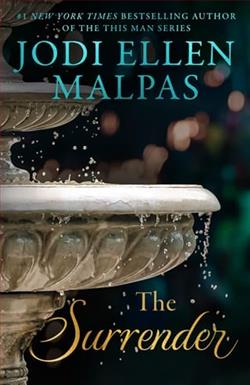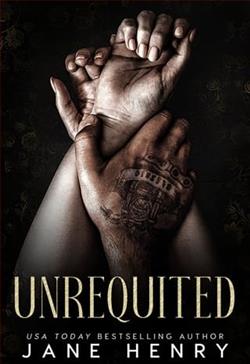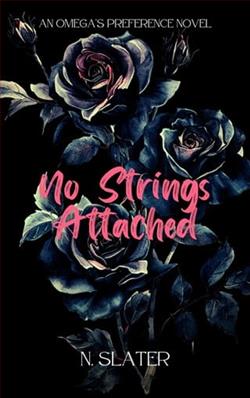Page 13 of The Daughters of Avalon
She hesitated. “Quite.”
Malcom didn’t budge. He held his ground, urging Merry Bells to stay. Although he was refreshed by her forthright nature, he was also bound and determined to earn not merely her trust, but her good manners and gratitude as well. He waited for an apology.
“Very well,” she said, obviously expecting it to be the end of their discourse. She leaned forward, pressing her knees into Merry Bells’ withers, but the horse, like her master, remained steadfast. Nibbling at tufts of grass, she, too, stood stubbornly, and after a moment, she urinated where she stood, squatting so that Elspeth was forced to lie back against him.
Malcom smirked. “Very well what?”
The lass sighed louder than she snored, and Malcom suppressed another chuckle.
“Very well! Very well!” she snapped. “If you will not abandon me on this detestable man’s land, I will endeavor to be…”
“What?”
“Less rude.”
“Thank you, madam,” he said, still waiting. “And perhaps even agreeable?”
“Aye,” she said. “I will.”
“Thank you,” Malcom said, and clicked the reins, prompting Merry Bells into an easy canter, despite the lack of proper apology. It was enough that she would cease and desist with her temper.
Chapter
Six
Feeling chastised, with good merit, Elspeth lapsed into silence, listening to theclop, clopof the horse’s hooves—a sound that was slowly, inexorably, lulling her back to sleep.
Sweet fates. What was this terrible languor?
Even now, seated before this stranger, she fought a new wave of sleepiness as her gaze scanned the vaguely familiar landscape—less mountainous now, with light and airy forests.
She had no idea what lay ahead, but she did know what she was leaving behind, and she swallowed her grief like a glob of sticky porridge, her emotions bedeviling her.
It wasn’t merely her sisters she was taking leave of. It was Wales itself, and the spirit of the land, which was even now shedding itself from her like a mantle being stripped from her back.
If she was cross, it was because her heart ached, and Malcom seemed far too ready to taunt her. If only he understood how devastating this was. If only he could comprehend what travesty had befallen her the last time she’d arrived in this land—mayhap then he wouldn’t tease her so mercilessly. It was more than twenty years later now, but she knew too much as a woman offour and twenty to feel aught but trepidation over returning to England.
She remembered only too well that journey she’d taken to London with her grandmamau. Less than six months later, she was dead.
Remember, Elspeth, never forget…
I will not forget,she promised Rhiannon.I will never forget.
And yet, unlike Rhiannon, Elspeth dared not make revenge herraison d’être. It was far more honorable to fight her mother by championing all that was good. It was for that reason she must remain Matilda’s champion. Like Robert, she would do so until her dying breath. And, if, in truth, Elspeth was more invested in Matilda’s cause than her sisters, it was because she believed with all her heart that if Matilda won this untenable war, only then could justice ever be served.
It aggrieved her so much that Rhiannon could not understand and forgive their half-sister. Instead, she huffed and fumed, and the more she did so, the harder grew her heart—and if there was one thing Elspeth feared in this world, it was the thought of Rhiannon following in Morwen’s path. It was a terrifying visage. Already, Rhiannon had too much of their mother. In fact, but for the color of her hair and eyes, she was the spitting image of Morwen. Like their grandmother, Rhiannon bore the mark of the Mother—the crossed, amber-lit gaze that distinguished her as the regnant priestess, and the Craft was stronger with her than it ever was with Morwen. But if her sister ever learned to use her gifts with such a bitter heart, Elspeth loathed to think what might become of her.
Of all her living sisters, Rhiannon loathed their mother most, with good reason. Nestled in Morwen’s womb, she and a twin had suffered a mother’s worst betrayal. Having sensed the bounteous gift their grandmamau had bestowed upon the unborn twins—strong Welshmagik, powerful enough for twobabes—and realizing she’d been deprived of her birthright, Morwen had concocted a potion to still their beating hearts. Rhiannon lived; the twin did not. And now, Goddess save anyone who came between her sister and her vengeance.
Insomuch as Morwen seemed to defy the tenets of their coven, and as horrible a mother as she was, the Goddess had certainly blessed her womb well enough. She’d born two sets of twins in her lifetime, and she hadn’t a nurturing bone in her body. Elspeth hoped with all her heart that Rhiannon would rise above such meanness, but only time would tell.
One thing was certain. Ersinius had better stay out of Rhiannon’s way. Contrary to what folks believed about witches, she couldn’t turn him into a toad, but she could easily mix a powder to sprinkle in his robes and rot away his manhood, andthatshe would do.
Doddering old man.Annoyed by the stupidity of men and thinking about the way Ersinius used to cross himself every time they chanced to breathe the same air, Elspethshook her head.
Really, it wasn’t as though any of them could raise the dead or bewitch the living. Not even Morwen had that kind of power—then, again, perhaps she did. After all, it was said she’d beguiled Henry, and whatever sway she’d held over Elspeth’s father, she now appeared to hold over Stephen as well. In truth, Elspeth didn’t know what her mother was capable of. She’d heard rumors of glamour spells and shapeshifting, such as was done by the Death Crone, but she’d never once witnessed any of that manner ofhud du. When pressed, her grandmamau had said that all knowledge of those dark arts—if ever they’d existed—had passed away with the fall of Avalon. But, in truth, unless Elspeth ever got her hands on her grandmother’sgrimoire, she would never know for sure. Whatever spells she and her sisters knew, they knew by rote, after watching Morwen or her grandmother perform them. But witchcraft was not so muchwhat people supposed. To her own people it was better known as the Craft of the Wise. And, in their native tongue they were known asdewines, not witches. Translated more precisely, they were, indeed, enchantresses, but also bards, prophets and seers, and, as with any art, not everyone had the same skills. Certainly not all were dark.Her people held the earth in great esteem and believed all beings were connected—living and otherwise.Magikwas but another word for transformation, conjuration and creation and life was filled with these things—a butterfly emerging from a cocoon, a child born of a woman, a seedling emerged after a long winter, life born from a drop of water. But people were simply no longer open to miracles, even when proof existed before their eyes. Only now, in this time of persecution, this was their saving grace: People no longer believed in the Old Ways.
Elspeth cast a glance over her shoulder at her dubious savior—a minion of Stephen’s. Whatever gratitude she felt toward this man, it was tempered by resentment over his unswerving loyalty to the pea-brain who’d cast their nations into war.















